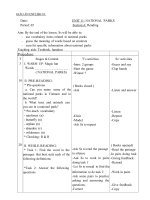Unit 11 National parks
Bạn đang xem bản rút gọn của tài liệu. Xem và tải ngay bản đầy đủ của tài liệu tại đây (112.84 KB, 3 trang )
Unit 11: NATIONAL PARKS
Part D. Writing
Teacher in charge: Tran Thien Nhan
Class: 10A4
Time: 45 minutes
Date of teaching: 19/02/2018
I. Objectives: By the end of the lesson, students will be able to write a letter of acceptance or refusal
II. Teaching aids: textbook, poster,
III. Procedure:
Time
5’
Contents
I. Warm-up: Agreeing game
Put the following expressions into the correct column.
1. I’d love to, but….
4. I’m sorry I can't come because…
2. Yes, I’d like/love to
5. Yes, that’s a great idea
3. Yes, I’d be delighted to 6. I’m afraid I can’t come because..
Ways of agreeing
Ways of disagreeing
T’s and ss’ activities
- T divides class into 2 group: A
and B.
- SS have 2 minutes to think
and put expression into correct
column.
- SS go to the board and write
down answers.
- the group with more correct
answers will be the winner.
Keys: Agreeing: 2,3,5
Disagreeing: 1,4,6
10’
Lead in:
“Today we are going to learn how to write a letter of agreeing
or disagreeing.”
II. Pre-writing
Vocabulary:
- delighted (adj) = happy : vui mừng (synonym)
- accept (v) =agree: chấp nhận
(synonym)
=> acceptance (n): sự chấp nhận
- refuse (v): từ chối
(antonym of accept)
=> refusal (n): sự từ chối
- Regard (n): lời chúc.
(translation)
Task 1: Below are some common ways of accepting or
refusing an invitation. Read them, and fill each blank of the
notes with a suitable expression (page 117).
Ways of accepting
Ways of refusing
Yes, I’d like/love to
I’m afraid I can’t come because…
Yes, that a great idea
I’d love to, but….
Yes, I’d be delighted to
I’m sorry I can't come because…
1. Dear Chi,
Something is wrong with my phone, so I’m leaving you this
note. Thanks for your invitation. I’d like to/ love to/ that’s a
great idea/ I’d be delighted to. How about meeting at the
school gate at 8:30?
Lien
2. Dear David,
- T elicits the new words and
models the pronunciation.
- T asks SS to repeat chorally
and individually.
- T corrects the pronunciation.
- T asks SS about Vietnamese
meaning.
- T notices the stress.
- SS copy down new words.
-T asks ss to run through the
task and the letters
- T asks ss to do the task in
pairs in 3 minutes
-T monitors the class and offers
help if necessary
-T calls ss to give the answers
and checks the answers with the
whole class
10’
Thanks for your note. I’m sorry I can’t because/ I’d love to,
but/ I’m sorry I can’t come because my father has been ill
since yesterday and I have to look after him.
Let’s go another time.
Mike
3. Dear Daisy and Tony,
Thanks very much for your invitation to dinner. Of course, I’d
be delighted to/ I’d like to/ love to/ that a great idea
I’m sure we will have a very good time together.
Susan
III. While-writing:
FORM OF A LETTER OF REFUSAL OR ACCEPTANCE
1. Starting:
- Date
- Greeting (Dear….,)
2. Body:
* Thanking for the invitation
- Thank for your letter
- Thank you for your invitation
* Stating acceptance politely + giving reason
refusal politely + giving reason
- It is great/ lovely to hear that you are going to…
- I would really like to come (acceptance)
- But I’m sorry I can't come because… (refusal)
*Suggesting place and time for meeting
- I’m sure we will have a nice time together and we will meet
next weekend (acceptance)
- I wish you have a nice trip and I hope we can get together
some other time (refusal)
3. Closing:
*Ending sentence
- acceptance:
+ I hope we have a great time and see you soon
+ Give my best regards to your parents and hope to see you
soon.
- refusal:
+ Thank you again for the invitation and have a great time on
your picnic
+ Thanks for thinking me, and give my best regards to your
parents. Have a great time on your picnic
- Your sincerely,
- Love/ yours faithfully/ yours sincerely
- Signature
Task 2: Rearrange the following sentences to make a letter
accepting an invitation to spend a weekend in the country.
Dear Nam,
a. You know how much I love spending a weekend in the
country after a long and hard term.
b. Give my best regards to your parents and hope to see you
soon.
c. I would really like to come.
d. Thank for your letter
e. It’s lovely to hear that you are going to spend the next
weekend in the country.
- T gives form of a letter of
acceptance or refusal and useful
language to help SS do Task 2
and write the letter easily.
-T asks ss to run through the
task and the sentences
-T asks ss to do the task
individually in 4 minutes
- T monitors the class and offers
help if necessary
-T calls ss to give the answers
and checks the answers with the
whole class
-T gives feedback and Ss take
notes
-T asks ss to do the task in
groups of 5 in 10 minutes.
f. I will catch the usual train on Friday evening.
Love,
Lam
**Answer keys: d – e – c – a – f – b
-T goes around to monitor and
offer help if necessary.
10’
Game: Who’s faster
Task 3: One of your friends has invited you to go for a picnic
to Cuc Phuong National Park next weekend. Write a reply
letter accepting his/her invitation.
8’
IV. Post-writing
- Correction
- Feedback
Sample writing:
Dear Minh,
Thank a lot for your letter. It is lovely to hear that you
are going to go for a picnic to Cuc Phuong National Park next
weekend. I would really like to come. I’m sure we will have a
nice time together and we will meet next weekend
I hope that we will have a great time and see you soon.
Love,
Hoa
V. Homework:
- Learn vocabulary by heart.
- Write a reply letter refusing his/her invitation for picnic to Cuc
Phuong National Park next weekend.
- Prepare the next lesson – Language Focus (page 118-119).
+ Pronunciation: /t/, /d/
+ Grammar: Conditional sentence type 3
Each group will write an letter
the first group stick their
writings on the board will be the
winner and received a special
gift.
-T asks ss to check whether
there are any mistakes in each
writing and elicits the correction
from the ss
-Ss take notes
2’
- T gives sample writing.
-T reminds
- SS listen and take note.









